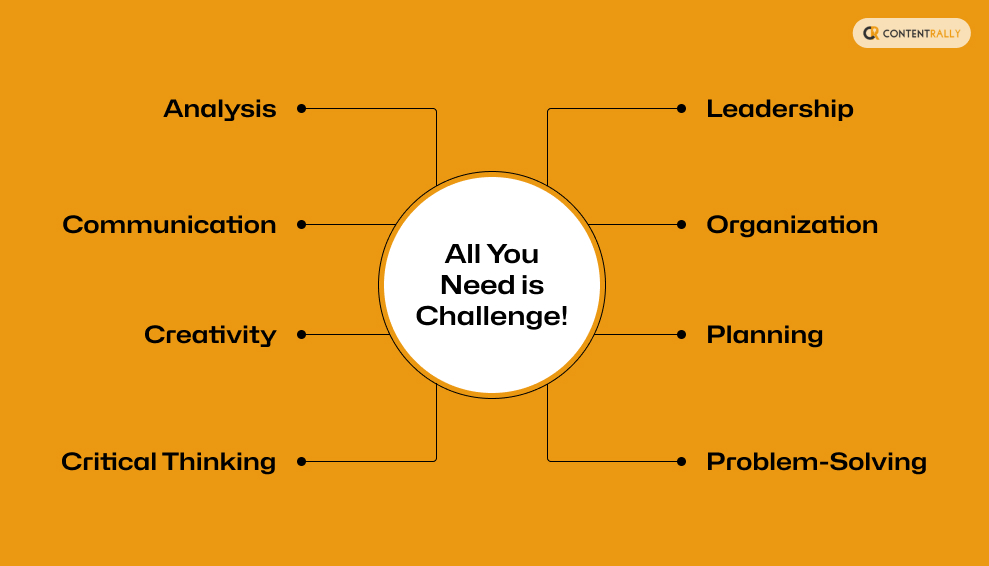“The ability to work with abstract ideas & concepts-” or, how Americal social psychologist Robert Katz would describe conceptual skills.
In fact, he said it was one of the basic skills which every manager should have!
Interestingly when psychologists test an individual’s aptitude of whether they will be a good leader, conceptual skills are one of the top meters of measurement.
Now, what are conceptual skills?
Is it just some abstract word? Or is there a scientific definition of this soft skill required from their employees by corporations nowadays?
Most importantly!
Can you hone your conceptual skills as an adult again?
Without any further ado let’s discuss the improvement areas required to build a conceptual skill, and the different means by which you can improve it.
What are Conceptual Skills?

Everyone can decipher something simple and covert, but it takes special skills to understand the deeper meaning behind abstract issues.
Most importantly, if these abstract matters pose a challenge and will require impromptu solving.
conceptual skill is about leaping beyond the daily mundane activity or being short-sighted. It is about seeing and articulating the bigger picture so that others sense it too.
For example, if you are working on a particular Search Engine Optimization strategy for your new website, you cannot ask for quick results.
You will require a long-term vision to see what can happen if you continue with the formula for at least a month or two.
This skill also requires a fair amount of research and dissection knowledge, seeing beyond the written words and literally deciphering the concept within.
People with good conceptual skills are often good at sales, market prediction, consumer/customer psychology, and chess (during their off time).
Conceptual skill is not a vague word but rather a compilation of eight examples of conceptual skills that you should always be working on.
- Analysis (there is a difference between seeing & observing what you see thoroughly).
- Communication (the ability to articulate in understandable words what you observe).
- Creativity (the ability to observe something with a unique imagination as opposed to everyone else).
- Critical Thinking (trying to understand what the view is not showing at first glance).
- Leadership (the ability to show the same to others and help them on that path).
- Organization (this is not just organizing tangible items but organizing one’s own thoughts & understandings).
- Planning (Only observation & comprehension is not enough. Enough planning skill is required for proper implementation)
- Problem Solving (the ability to execute resilience in the face of challenges).
Building Steller Conceptual Skills

Do not worry, when I saw everything, I needed to do to build conceptually skillfully, I was also overwhelmed.
Where to start & where to finish?
Most importantly, do I tackle it all at once? Or do I go about it one by one?
To begin with, when you are learning a new skill, you only tackle it in a timely manner. If you try to do everything at once, you do nothing properly. So, it is always better to learn one skill at a time.
However, these are soft skills. How can I learn them like I am learning from a college lesson?
This is also another valid question, do not worry, there are mindful activities, and daily challenges you can pursue to learn these better.
How to Learn Conceptual Skills Better

Here is a step-by-step guide to begin learning your conceptual skills.
Remember, these skills take time to learn!
It is not a matter of six months or a year, but a lifetime journey.
However, there are means in which you can check your progress. One of the biggest ones would be how your lifestyle & work personality changes from the time you begin learning this skill.
Step 1: Know Your Strengths & Weaknesses
Never start with an unknown skill; rather, begin with something that you are already aware of.
A good way to start is by doing a SWOT analysis of yourself.
Begin with marking the things you are good at (among the eight criteria given above), and the ones you need to work on.
If you are hypersensitive & can get easily overwhelmed, then begin with perfecting your strengths rather than concentrating on your weaknesses.
For example, I am anxious, so I began by polishing my creativity skills, which I was already good at. This gave me the motivation to tackle my weaknesses next.
However, if you are a motivated person , begin with targeting your weaknesses. Especially if this is all for interview prep.
Step 2: Do Something Everything
If you have been on a learning journey for quite some time, you must have heard these words of wisdom –
“Consistency is better than striving for perfection.”
Therefore, whenever you of building any skill, the first task is to ensure you do something every day.
Yes, there will be days when you will need more optimal motivation to sit with your skill-building activity. But, if you’re incorporating the activities into your daily routine, you should be able to see changes in time.
Step 3: Real Life Execution
A learned skill is useless if you cannot execute the same. Unfortunately, no one is going to stand with a placard shouting –
“This is your moment.”
Whether it is a situation at home or a conflict in the office, you will have to step out of your comfort zone and step into the challenge.
No, it won’t be easy, but rather a mindful decision you take every day. Before you feel overwhelmed with the idea of stepping in and solving a situation you are not called for, remember –
Everyone feels insecure about their professional skills at some level (no matter the years of experience).
You could work in the same industry for decades and still face something new. Learning has no end, so find your opportunities in everyday instances.
Conceptual Skills – How to Improve it

We have already discussed conceptual skills. Now, let’s understand how to improve these conceptual skills.
All You Need is Challenge!

Achieving professional success is more than just meeting deadlines or ticking boxes. It’s about mastering the right skills & focusing on conceptual management skills that give you an edge.
Let’s break down eight essential skills you should focus on—and a weekly challenge of self-intervention for each to help you improve.
Analysis
The difference between seeing and truly observing lies in depth. Analyzing is all about dissecting what you see and finding hidden patterns.
Challenge: Pick one topic or event daily and write a quick summary. Then, dig deeper—what did you notice beyond the obvious?
Communication
It’s not just about speaking or writing; it’s about making your thoughts clear to others. Effective communication bridges the gap between observation and understanding.
Challenge: Practice summarizing complex ideas in simple terms. Try explaining a work concept to a friend with no background in your field.
Creativity
Creativity isn’t just about thinking differently—it’s about connecting the dots in unique ways others might miss.
Challenge: Choose a random object daily and brainstorm five unconventional uses. Push your imagination!
Critical Thinking
Sometimes, what’s not immediately visible holds the key. Critical thinking pushes you to question the obvious and explore hidden layers.
Challenge: Read a news article or watch a documentary. Then, list three assumptions it makes and challenge them.
Leadership
Leadership isn’t just about guiding others; it’s about showing them a clearer path by sharing your unique insights.
Challenge: Each week, identify a workplace situation where you can take initiative. For example, you could guide a colleague through a process or host a quick knowledge-sharing session.
Organization
Beyond tidying up your desk, organizing involves structuring thoughts and ideas efficiently.
Challenge: At the end of each day, spend 10 minutes categorizing your tasks, ideas, and notes. Organize them into clear categories for better clarity.
Planning
Good ideas need solid plans to come to life. Proper planning bridges the gap between ideas and successful execution.
Challenge: Pick a small project this week (e.g., organizing a team lunch or personal task). Break it into detailed steps and set mini-deadlines for each.
Problem-Solving
Life throws curveballs. Resilience in problem-solving helps you bounce back, adapt, and find innovative solutions.
Challenge: Take on one issue nagging you at work or in life. Brainstorm multiple solutions, pick the best one, and act on it.
Final Note!
Incorporating these challenges weekly could transform how you approach your work. The more you practice, the sharper these skills become.
Building conceptual skills isn’t a one-time task; it’s a continuous journey. Each skill strengthens your foundation for long-term career growth.
By practicing regularly and embracing challenges, you’ll develop a sharper mind, better communication, and a unique approach to problems. Remember, growth isn’t just about working harder—it’s about thinking smarter.
Ready to level up? Start your first challenge today!
Read Also:






















